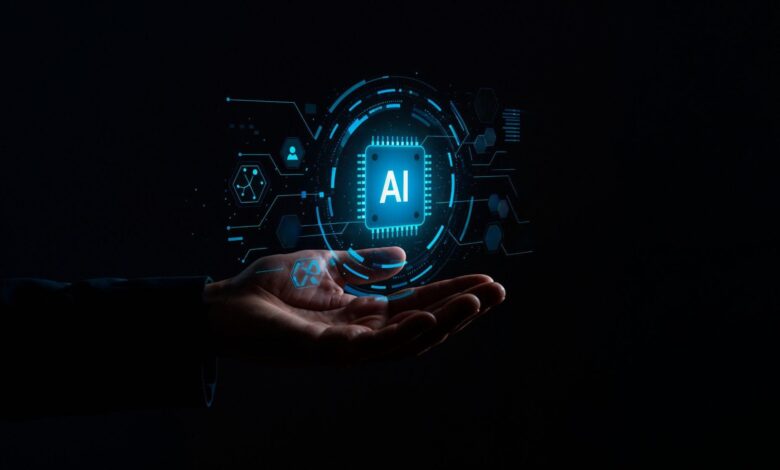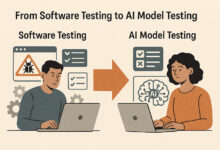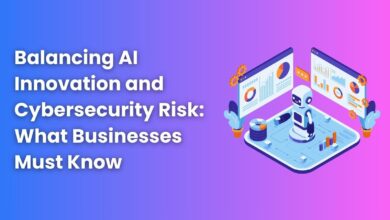Integrating AI with Blockchain: Opportunities, Challenges, and Proven Use Cases for Your Industry

The integration of Artificial Intelligence (AI) with blockchain technology is rapidly shifting from theory to reality. According to MarketsandMarkets, the global AI in blockchain market is expected to grow from USD 0.2 billion in 2020 to USD 0.7 billion by 2026, reflecting the increasing demand for secure, intelligent, and transparent digital solutions. This combination is being adopted across finance, healthcare, supply chain, manufacturing, and other industries to improve efficiency, enhance trust, and enable data-driven decision-making.
In this blog, we will explore how integrating AI with blockchain offers real business opportunities, the challenges you may face, and some proven use cases for different industries.
Why AI and Blockchain Are a Powerful Combination
Individually, both AI and blockchain are disruptive technologies. AI processes and analyzes massive datasets to extract insights, automate processes, and make predictions. Blockchain, on the other hand, stores data in a secure, immutable, and transparent manner. When combined, they offer:
- Trustworthy AI decisions – A blockchain development company can implement systems that store AI models, training data, and decision records in a tamper-proof way, ensuring reliability and accountability.
- Better data management – AI can process data stored on blockchain for pattern recognition and analytics, and with the right blockchain development company, this process can be optimized for speed and accuracy.
- Automation with transparency – Smart contracts can execute AI-driven decisions in real-time without human intervention, while a blockchain development company can ensure these automated processes remain secure and compliant.
This integration opens the door to a wide range of practical applications for industries seeking more secure and intelligent systems.
Real Opportunities for Industries
1. Finance and Banking
In the financial sector, fraud detection and risk assessment are critical. AI algorithms can analyze blockchain transaction histories to detect unusual activity in real time.
For example, AI-powered systems can flag suspicious cryptocurrency transactions before they escalate into larger issues.
Additionally, blockchain’s decentralized nature reduces reliance on intermediaries, while AI enhances automation in tasks like credit scoring, loan approvals, and portfolio management.
2. Healthcare
The healthcare industry handles sensitive patient data that must be stored securely and shared only with authorized parties. AI can analyze patient data to predict health risks and recommend personalized treatment plans, while blockchain ensures that patient records are tamper-proof and easily auditable.
For instance, AI-driven diagnostics, such as predicting disease outbreaks, become more reliable when combined with verified data from blockchain networks. This can help medical organizations take proactive measures based on trustworthy information.
3. Supply Chain and Logistics
AI algorithms can forecast demand, optimize delivery routes, and reduce delays. When integrated with blockchain, every step of the supply chain can be tracked and verified from raw material sourcing to the final product delivery.
For example, a food company can use AI to predict product demand and blockchain to verify the authenticity of ingredients, ensuring both efficiency and transparency.
4. Energy Sector
With the growth of renewable energy sources, balancing supply and demand is becoming complex. AI can predict energy needs using weather data, while blockchain records production and distribution transparently. Companies use AI Development Services to create smart energy trading and monitoring systems.
For example, peer-to-peer (P2P) energy trading, where households with solar panels can sell excess power to neighbors. AI optimizes the pricing, and blockchain ensures secure transactions without intermediaries.
5. Manufacturing
AI can predict machine maintenance needs and reduce downtime, while blockchain keeps a verifiable record of all maintenance activities. This combination ensures both efficiency and compliance with quality standards.
For example, a manufacturing plant can use AI to forecast when a machine will need servicing, and blockchain can verify that the maintenance was done according to regulations.
Key Challenges in Integrating AI with Blockchain
While the opportunities are significant, organizations should also be aware of the challenges involved in combining AI and blockchain.
1. Scalability Issues
Blockchain networks can have slower transaction speeds compared to traditional databases, and AI requires large datasets to operate effectively. Balancing speed, storage, and processing requirements is a key challenge.
2. Data Privacy and Security
Although blockchain ensures data integrity, storing sensitive AI training data on a public blockchain can raise privacy concerns. Companies must implement encryption and data-sharing controls to prevent unauthorized access.
3. Energy Consumption
Both AI and blockchain can be resource-intensive. AI model training requires significant computing power, and blockchain consensus mechanisms like Proof of Work consume high amounts of energy. Transitioning to energy-efficient algorithms and consensus models is necessary.
4. Integration Complexity
Bringing AI and blockchain together involves multiple layers of integration from data pipelines to model deployment and smart contract automation. Without experienced teams, this process can be costly and time-consuming.
5. Regulatory Compliance
Industries such as finance and healthcare operate under strict regulations. Organizations must ensure that both their AI models and blockchain implementations meet legal standards, which may vary across regions.
Proven Use Cases Across Industries
The following examples show how AI and blockchain integration is already making an impact:
● Predictive Maintenance in Aviation
Airlines are using AI to predict when aircraft components need servicing, while blockchain logs all maintenance records. This reduces operational downtime and ensures compliance with aviation safety regulations.
● Smart Insurance Claims
Insurance companies are implementing AI to analyze claims data and detect fraud, while blockchain secures records, and tools like an AI Trading Assistant help process blockchain-based market data for better trading decisions.
● Decentralized Autonomous Organizations (DAOs)
DAOs use blockchain for governance and AI for decision-making optimization. For example, AI can analyze member votes and suggest policies, while blockchain records every action transparently.
● Sustainable Agriculture
AI predicts crop yields and detects pest infestations early, while blockchain tracks the journey of food from farm to table, ensuring ethical sourcing and sustainability.
● Anti-Money Laundering (AML) Compliance
Banks use AI to analyze blockchain-based transaction patterns to detect illegal activity. Blockchain stores compliance reports in an immutable format for regulatory review.
Best Practices for Implementation
Organizations planning to integrate AI with blockchain should follow these best practices:
- Start with a clear business goal – Identify the exact problem you want to solve.
- Choose the right blockchain type – Public, private, or consortium, depending on your security and speed needs.
- Focus on data quality – AI results depend on the quality of the data being analyzed.
- Ensure interoperability – Your AI and blockchain systems should work seamlessly with existing business processes.
- Collaborate with experts – Partnering with a Blockchain development company or providers of AI Development Services can simplify the technical integration process.
Conclusion
The integration of AI and blockchain offers industries a unique opportunity to build smarter, more transparent, and secure systems. From finance to agriculture, this combination is already proving its value in real-world applications. While challenges such as scalability, privacy, and compliance exist, they can be addressed through careful planning and the right technology choices.
As adoption grows, businesses that invest early in AI and blockchain integration will be better positioned to streamline operations, improve trust, and leverage data-driven decision-making for long-term growth.





